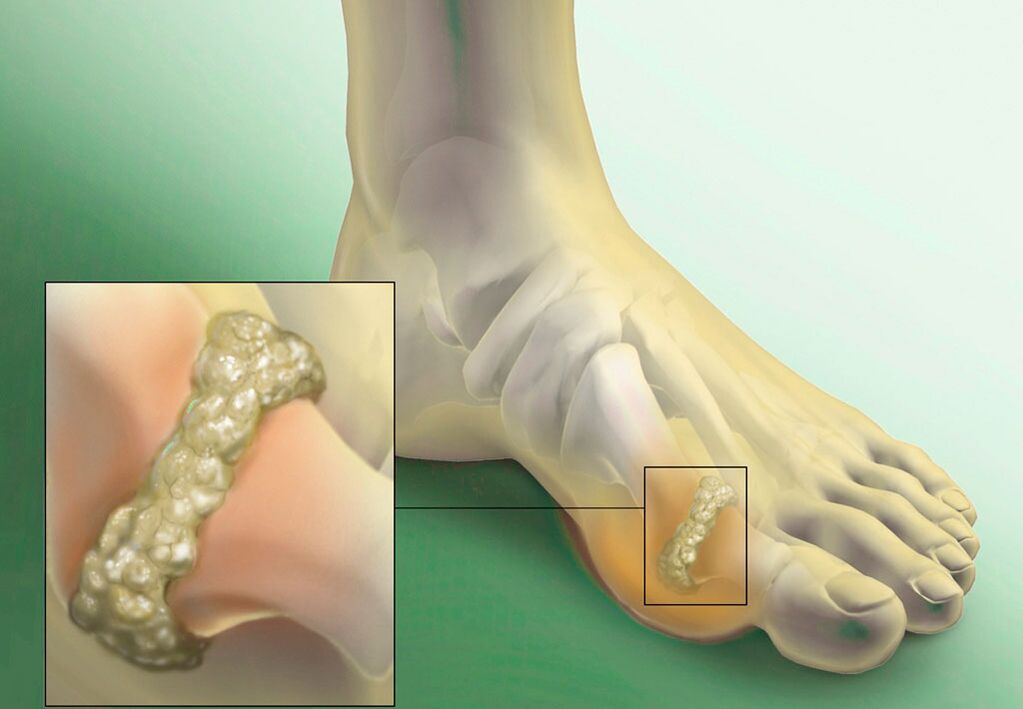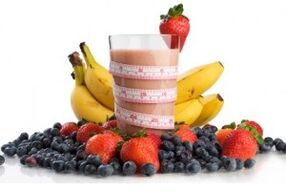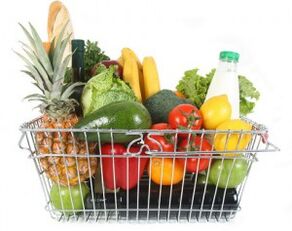The modern world is full of all kinds of food temptations. At every step we come across shops where bars, chips, rolls, pies and more are delicious, but will certainly sooner or later lead to stomach and digestive diseases in general.
In ancient times, when such diseases occurred, the patient was unaware of the methods of treatment and pursued a normal lifestyle, exacerbating his condition, which ultimately resulted in catastrophic consequences and sometimes even death.
Today, there are many treatment options for diseases of the gastrointestinal tract. However, for a successful treatment, you need to limit yourself and completely review your usual diet.
What is gout?

Gout is a disease that is directly related to disorders in the human body. In gout, the salts of uric acid remain in the joint tissues, leading to very serious consequences. Gout was first mentioned during the life of Hippocrates and then had many manifestations.
Fortunately, the disease is less common today, with about three cases per thousand people, although outbreaks have become more common in recent years.
Such an increase in the rate of disease is related to the disease and the amount of food consumed by humans.
Initially, an acute increase in the concentration of uric acid in a person’s blood leads to the disease. Derivatives of this concentration travel through the body through the bloodstream and are deposited in joints, muscles and even organs. Such deposits are dangerous because infected tissue can be destroyed. The increase in the concentration of this acid is caused by the kidneys not having time to process and remove the excess production from the body. The problem can also be caused by kidney disease and malfunction.
The first symptoms of the disease are joint pain, redness of the big toes and fever. It is worth noting a very important point that if you do not see a doctor at the first symptoms and delay the disease, the affected joint will be completely destroyed and this will lead to disability and if the organ is destroyed, permanent pain and death is possible. Therefore, the disease should be taken as seriously as possible.
The manifestation of gout depends directly on how and what a person eats and how they live. It is not without reason that gout has previously been called the "disease of kings", as an inactive lifestyle, constant consumption of fatty, heavy foods, and excessive alcohol consumption together cause metabolic problems and consequently similar diseases. moreover, strict adherence to proper diet and diet to reduce acid production is considered a major consideration. To determine the level of uric acid in the blood, only blood should be added for analysis.
How to eat right?

The peculiarity of developing a diet for patients with gout is the restoration of uric acid metabolism in the body. If you do not take urgent action to restore this level, excess acids (sodium urate) are corrected throughout the body and cause widespread inflammation.
In addition to setting the necessary diet, doctors are advised to take medication as well as regular physiotherapy procedures, and the gouty person is advised to lead a more active lifestyle, walk and exercise in the fresh air.
Speaking of diet, it should be noted that a necessary step will be to exclude many contraindicated foods from the diet. When the disease worsens, fish and meat should not be eaten, and fasting days should be arranged at least twice a week, ideally every other day.
The fasting days for gout patients are as follows:
- Fruits and vegetables. You should eat one and a half kilograms of fruit a day, as your diet allows.
- Milk and kefir. In this case, the patient should drink no more than two liters of this fluid per day.
- Cottage cheese and kefir. You should eat four hundred grams of cottage cheese and drink half a liter of kefir.
Such fasting days are useful as they help to dissolve and remove uric acid in the body. When the worsening of the disease subsides, the patient can still eat fish and meat, but strictly steamed, cooked or fried. It is worth noting that these products should be eaten no more than three times a week and not more often.
It is necessary to adhere to the correct water system. Drink about three liters of clean water a day. At the time of worsening the disease, drink one hour before a meal. If there is no aggravation, the water can be replaced with another liquid, the point is to be natural and fresh. You can also drink alkaline mineral water.
Fasting in gout is contraindicated, in which case the acid level rises sharply, it is better to eat little but often.
Recommended for gout
In case of gout, you should eat natural and healthy foods. You can make a menu of these products every day, but talk to your doctor about their dosage, as the diet can be unique to everyone.
List of acceptable products:
- Meat products: turkey, rabbit, chicken; chicken eggs.
- lean fish; seafood: squid, shrimp.
- Cereals: semolina, oatmeal, millet, rice, buckwheat.
- Pasta; black and white bread.
- Vegetables: white cabbage, zucchini, eggplant, cucumbers, beets, potatoes, carrots.
- Onions, garlic, dill.
- Fruits: citrus fruits, apples, pears, apricots, melons and watermelons, peaches.
- Berries: everything is possible except grapes and raspberries; dried fruits other than raisins; nuts.
- Sweet: not chocolate, candy, marmalade, jam, marshmallows, honey.
- Natural drinks: juices, fruit drinks, fruit drinks, kvass, an hour with lemon, rosehip or bran broth.
- First courses without broth, olive oil; the second dishes are cooked or steamed products.

You can eat other foods, but in small quantities, such as cooked sausages, bacon, sausages. You can eat tomatoes and plums about twice a day and twice a week.
The use of salt should be completely ruled out or significantly restricted. It is better to cook the food completely without salt and salt the prepared food already on the table. Of course, pickles, pickles, and most spices should be taken out of the diet.
It is recommended to reduce the consumption of protein foods (especially red meat) as the accelerated metabolism of proteins causes an increase in urea concentration. If you are overweight, you should limit your intake of carbohydrate foods (especially baked goods, pastries).
Honey and figs, plums, grapes, certain types of vegetables and root crops (beets, celery, rhubarb, cauliflower, peppers) and mushrooms should only be included in the diet during remission.
Otherwise, consult a doctor who prescribes a more detailed diet for some degree of illness.





















